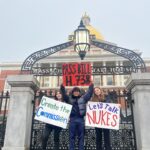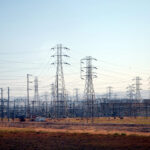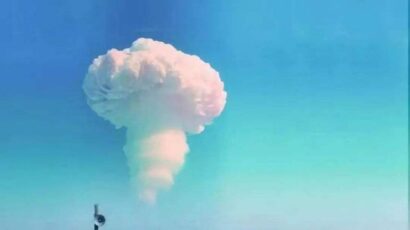Opportunity after the disaster
By Masako Toki | July 17, 2012
Japan’s energy policy is now at its most critical juncture since the inception of nuclear power in 1966. Nearly 16 months after the disaster at the Fukushima Daiichi Nuclear Power Station — the world’s worst nuclear crisis since Chernobyl — Japan’s nuclear policy has finally started to transform.
After much delay, on June 20 the Japanese Diet enacted a bill to create a new independent regulatory commission for nuclear safety. The government decided to establish the commission to bolster Japan’s nuclear safety standards after facing acute criticism that the system in place during the earthquake and tsunami failed to appropriately and effectively respond to, or even prevent, the nuclear crisis. Currently, the Nuclear and Industrial Safety Agency is housed under the Ministry of Economy, Trade, and Industry — which promotes nuclear energy. The new agency is expected to combine safety and regulatory functions and be completely separate from organizations that promote nuclear power. The new commission is scheduled to be online by September.
However, while promoting the bill for the new nuclear regulatory body, the Diet also — more stealthily — amended Japan’s Atomic Energy Basic Law by inserting language that connects Japan’s nuclear power policy to “security.” This amendment generated a lot attention from the public and major media outlets, causing significant controversy inside and outside Japan and reigniting questions about Japan’s avowed commitment to being a non-nuclear weapon state. South Korea is especially concerned, asserting that the revision will pave the way for Japan to develop nuclear weapons. While it is unlikely that Japan will use nuclear energy for military purposes (Japanese law limits the use of nuclear energy to peaceful purposes), this strong negative reaction clearly shows the deep-rooted distrust many neighboring countries still harbor toward Japan. And sending the wrong signals will only continue to foment that distrust.
When questioned about the amended language, Nuclear Disaster Minister Goshi Hosono responded that “the word ‘security’ precisely means the prevention of nuclear proliferation.” Of course, if the true intention of revising the Atomic Energy Basic Law is to enhance nuclear security and nonproliferation, why not say so explicitly? Or why not say that nuclear policy should “contribute to international security” instead of “national security”? The ambiguity only leaves room for further debate — which is why Japan should take an unequivocal stance on nuclear nonproliferation and disarmament, one that clearly demonstrates its intention with the implementation of an actual policy. Without precise language in the Atomic Energy Basic Law, Japan’s nonproliferation and disarmament credentials will only weaken and Japan’s relations with neighboring countries will only further deteriorate.
The good news, however, is that Japan is at a moment of truth. The unprecedented disaster at Fukushima has given Japan a pathbreaking opportunity to review its long-term nuclear policy and to unmistakably demonstrate its commitment to nuclear nonproliferation and disarmament.
After intense study of the fuel cycle, and almost eight months of deliberation, the Japan Atomic Energy Commission submitted its recommendations to the Energy and Environment Council. The council then laid out three scenarios for the future of Japan’s energy policy, with three different nuclear energy shares in the nation’s total power supply by 2030. All three scenarios reduce the country’s reliance on nuclear energy: The first drops nuclear power to 0 percent, the second to 15 percent, and the third to 20-25 percent. Under scenario one, all nuclear spent fuel would be directly disposed of and buried underground; in scenarios two and three, both reprocessing and direct disposal methods would be used. The government is scheduled to release the back-end nuclear fuel-cycle policy in August when it determines the final ratio of nuclear power in the total energy supply.
The Energy and Environment Council is holding extensive public hearings on the three scenarios at 11 sites across the country, inviting public comment on their website and via letters; the council is also holding an opinion poll in early August. Additionally, and particularly notable, the government plans to introduce “deliberative polling,” which will incorporate discussion meetings with respondents in an effort to reflect public opinion in the new energy policy. But, while these well-planned initiatives to get the general public involved in the decision-making process for the nuclear share of the energy supply are important, the way that public opinion is reflected in the specific policy on spent fuel management is still unclear. The nuclear spent fuel management policy options that the Energy and Environment Council will attach to each of the three options on nuclear energy ratios are uncertain — leaving the implication that the government does not want to completely give up a reprocessing option. That’s a mistake: If Japan is serious about reducing its reliance on nuclear energy, moving away from its reprocessing policy is the necessary first step. Asking the public to weigh in on the proportion of nuclear energy to be used but obscuring how those opinions will be reflected on fuel-cycle policy undermines the transparency the government is attempting to create.
Japan has long been a nuclear disarmament advocate, but it has also been criticized for keeping its latent nuclear weapon development capability alive with a huge amount of separated plutonium. Japan has accumulated enough plutonium to begin nuclear weapon production. This must stop immediately. Japan’s reprocessing policy is long overdue for a change.
By the end of 2010, Japan possessed 44.9 metric tons of separated plutonium — 9.9 metric tons within the country and 35 metric tons at reprocessing plants in Britain and France. Though the nuclear fuel stockpile being held abroad is technically slated to return to Japan for use in domestic nuclear facilities, the fuel is accumulating faster than it is being used, leading some to point out that the material is de facto providing Japan with a latent nuclear weapons capability. Meanwhile, Japan is in the testing phase of a domestic reprocessing plant; once that plant becomes commercially operational, it will separate and stockpile up to eight metric tons of plutonium annually — enough to produce 1,000 nuclear weapons.
Proponents of reprocessing assert that it is essential for an energy-poor Japan to efficiently use its uranium resources to maintain recycled indigenous plutonium sources for energy security. But in Japan, perpetuating the use of nuclear energy, the world most dangerous energy source, is no longer valid after Fukushima. Besides, if Japan stops reprocessing, it will definitely weaken other countries’ — especially South Korea’s — arguments for domestic reprocessing technology development. Ultimately, accumulating separated plutonium only increases proliferation concerns and decreases Japan’s ability to be a leader in nuclear disarmament and nonproliferation.
Since the advent of the nuclear age, perhaps no other country has had a more intricate connection with nuclear energy — both militarily and peacefully — than Japan. Japan’s decisions on nuclear policy will have a significant impact on regional and global nonproliferation efforts. That’s why creating forums for people to exchange opinions, using precise language in policy efforts, and taking steps to promote disarmament are all so crucial. Japan’s nuclear policy is at the turning point, and both its citizens and government are vital to determining how successful that policy will be.
Together, we make the world safer.
The Bulletin elevates expert voices above the noise. But as an independent nonprofit organization, our operations depend on the support of readers like you. Help us continue to deliver quality journalism that holds leaders accountable. Your support of our work at any level is important. In return, we promise our coverage will be understandable, influential, vigilant, solution-oriented, and fair-minded. Together we can make a difference.
Topics: Nuclear Energy, Opinion















